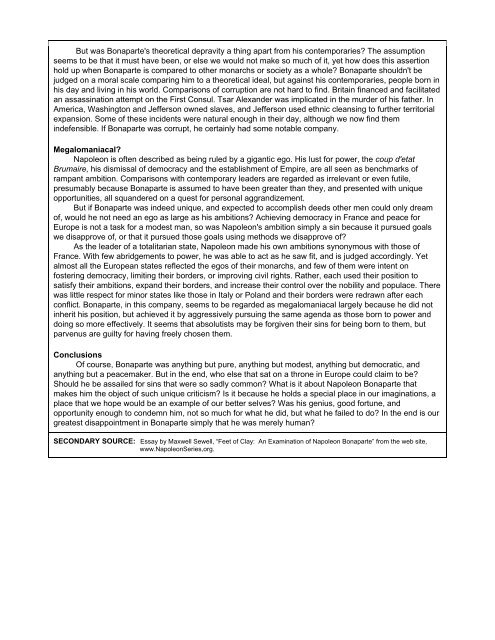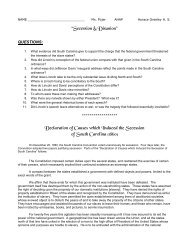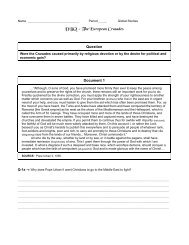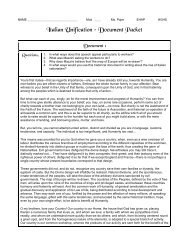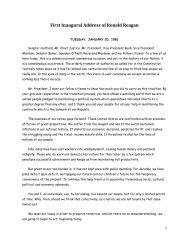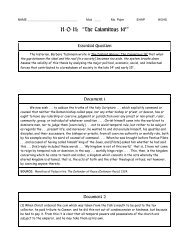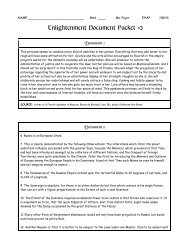Napoleon Bonaparte: An Assessment by ... - Historyteacher.net
Napoleon Bonaparte: An Assessment by ... - Historyteacher.net
Napoleon Bonaparte: An Assessment by ... - Historyteacher.net
Create successful ePaper yourself
Turn your PDF publications into a flip-book with our unique Google optimized e-Paper software.
But was <strong>Bonaparte</strong>'s theoretical depravity a thing apart from his contemporaries? The assumption<br />
seems to be that it must have been, or else we would not make so much of it, yet how does this assertion<br />
hold up when <strong>Bonaparte</strong> is compared to other monarchs or society as a whole? <strong>Bonaparte</strong> shouldn't be<br />
judged on a moral scale comparing him to a theoretical ideal, but against his contemporaries, people born in<br />
his day and living in his world. Comparisons of corruption are not hard to find. Britain financed and facilitated<br />
an assassination attempt on the First Consul. Tsar Alexander was implicated in the murder of his father. In<br />
America, Washington and Jefferson owned slaves, and Jefferson used ethnic cleansing to further territorial<br />
expansion. Some of these incidents were natural enough in their day, although we now find them<br />
indefensible. If <strong>Bonaparte</strong> was corrupt, he certainly had some notable company.<br />
Megalomaniacal?<br />
<strong>Napoleon</strong> is often described as being ruled <strong>by</strong> a gigantic ego. His lust for power, the coup d'etat<br />
Brumaire, his dismissal of democracy and the establishment of Empire, are all seen as benchmarks of<br />
rampant ambition. Comparisons with contemporary leaders are regarded as irrelevant or even futile,<br />
presumably because <strong>Bonaparte</strong> is assumed to have been greater than they, and presented with unique<br />
opportunities, all squandered on a quest for personal aggrandizement.<br />
But if <strong>Bonaparte</strong> was indeed unique, and expected to accomplish deeds other men could only dream<br />
of, would he not need an ego as large as his ambitions? Achieving democracy in France and peace for<br />
Europe is not a task for a modest man, so was <strong>Napoleon</strong>'s ambition simply a sin because it pursued goals<br />
we disapprove of, or that it pursued those goals using methods we disapprove of?<br />
As the leader of a totalitarian state, <strong>Napoleon</strong> made his own ambitions synonymous with those of<br />
France. With few abridgements to power, he was able to act as he saw fit, and is judged accordingly. Yet<br />
almost all the European states reflected the egos of their monarchs, and few of them were intent on<br />
fostering democracy, limiting their borders, or improving civil rights. Rather, each used their position to<br />
satisfy their ambitions, expand their borders, and increase their control over the nobility and populace. There<br />
was little respect for minor states like those in Italy or Poland and their borders were redrawn after each<br />
conflict. <strong>Bonaparte</strong>, in this company, seems to be regarded as megalomaniacal largely because he did not<br />
inherit his position, but achieved it <strong>by</strong> aggressively pursuing the same agenda as those born to power and<br />
doing so more effectively. It seems that absolutists may be forgiven their sins for being born to them, but<br />
parvenus are guilty for having freely chosen them.<br />
Conclusions<br />
Of course, <strong>Bonaparte</strong> was anything but pure, anything but modest, anything but democratic, and<br />
anything but a peacemaker. But in the end, who else that sat on a throne in Europe could claim to be?<br />
Should he be assailed for sins that were so sadly common? What is it about <strong>Napoleon</strong> <strong>Bonaparte</strong> that<br />
makes him the object of such unique criticism? Is it because he holds a special place in our imaginations, a<br />
place that we hope would be an example of our better selves? Was his genius, good fortune, and<br />
opportunity enough to condemn him, not so much for what he did, but what he failed to do? In the end is our<br />
greatest disappointment in <strong>Bonaparte</strong> simply that he was merely human?<br />
SECONDARY SOURCE: Essay <strong>by</strong> Maxwell Sewell, “Feet of Clay: <strong>An</strong> Examination of <strong>Napoleon</strong> <strong>Bonaparte</strong>” from the web site,<br />
www.<strong>Napoleon</strong>Series,org.


